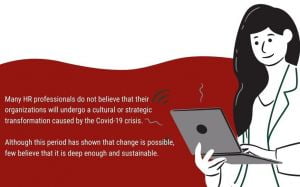Defined as a complex set of values, traditions, and practices (both formal and informal), a company’s organizational culture is notoriously difficult to change. Extraordinary events are needed for such a process to take place – for the century we live in, the Covid-19 pandemic will probably remain among the few such events. One year after the outbreak of this global crisis, very few companies have remained unaffected.
![organizational culture]() Leaders need to change (if they haven’t already)
Leaders need to change (if they haven’t already)
Looking at periods of recession and previous crises, we can be almost certain that the pandemic we are still going through will transform our professional lives – the level of satisfaction for the work we do, the confidence we have in those we work with, and, last but not least, the behavior of those who lead.
Although, at first glance, we would have expected physical distance, lack of direct interactions, layoffs, etc. caused by the pandemic to have disastrous effects on the internal cultures of companies, the reality turns out to be different. An analysis of more than 1.4 million comments left by employees in the United States on the well-known website glassdoor.com indicates that website visitors positively assessed the internal cultures of organizations in March-August 2020. Analysis of the content of these comments indicated that referred to an improvement of communication at leadership level. In other words, leaders communicated more and better with employees who positively appreciated the change – especially the honesty and transparency of those in charge.
Following this idea, another study conducted in April 2020 indicated that more than half of the 400 human resources leaders who answered the questions particularly appreciated communication efficiency as an absolutely essential skill for a healthy internal culture. In addition, another piece of research confirmed that employees place more trust in information provided by employers in the context of the Covid-19 pandemic than in government, traditional media or social media.
Beyond communication, the general behavior of managers will not be forgotten by employees. During times of intense stress, people return to their basic instincts. During the evolution of the pandemic, we were able to observe extreme reactions from leaders – some adopted ethical behavior, sacrificing their own income and making efforts to protect and maintain their employees, while others chose less honorable actions and lacked empathy. The consequences of these behaviors will certainly be seen when these companies need to attract employees again. Leaders who have shown empathy, who have managed to maintain a high level of energy among employees, who have encouraged open communication at the expense of a rigid one, will be able to maintain and continue to attract a well-trained and motivated workforce.
Separated but together
Contrary to initial expectations, it seems that working from home has not affected the internal culture of organizations and the relations between their members as negatively as we thought they would. When it comes to employees’ relationship with the work they do, it seems that the pandemic had a clarifying role and strengthened existing beliefs and attitudes.
A study by Quartz and Qualtrics, a company that helps employers improve employee experience, indicated that 37% of the 2,100 people surveyed reported positive changes in organizational cultures. Only 15% of respondents indicated otherwise. The interviewees came from various cultural areas – Hong Kong, Great Britain, Germany, France, Canada, Australia, France, South Africa, Kenya, Nigeria and the USA. They also reported an increase in positive attitudes such as a desire to help or goodwill.
Another interesting element highlighted by this research is an increased level of closeness between employees. Even if we see less of our colleagues, the current situation has given us a different, more intimate perspective on their lives. Pets and children make their presence felt during video conferences, the order or chaos in the spaces where we work transpires as well.
Not all employees experience these changes in the same way – the number of women who have experienced a positive change in terms of organizational culture is 40% lower than the number of men who have reported this. More than half of the male respondents said they felt more connected to the organization they belong to, while only 28% of employees were able to say the same. Most likely, these differences are due to the fact that women were stronger and more negatively impacted. Several studies seem to indicate the same thing – that women have taken on more childcare responsibilities, leading to increased fatigue and stress plus decreased efficiency and even the installation of mental health imbalances.
Even if most of the fears about the possible collapse of organizational cultures have not been met, the main challenge will be to maintain positive phenomena in the long run. Even if HR professionals believe that their organizations have the capacity to persevere and cope with the current crisis, one question remains unanswered – to what “normal” will we return? Will organizations be able or not to maintain the positive changes registered during the crisis? Many of these professionals do not believe that their organizations will undergo a cultural or strategic transformation caused by the Covid-19 crisis. Although this period has shown that change is possible, few believe that this change is profound enough and sustainable.


 Leaders need to change (if they haven’t already)
Leaders need to change (if they haven’t already)